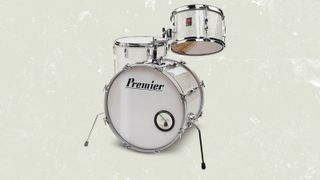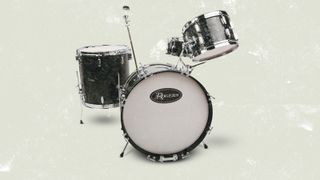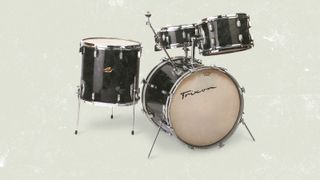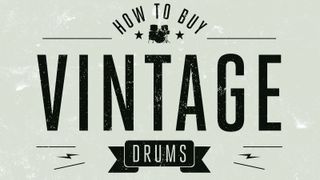MusicRadar's sister magazine Rhythm's vintage gear pages started back in 2006 and have since featured over 160 oldies - some rare and valuable, many more modest but equally treasured. So just how hard is it to find and safely land your own vintage prize?
In the first of our two-part feature, previous contributors to Rhythm's vintage gear pages share their experiences and know-how…
1. Where to look
As regards buying vintage, or simply old/interesting gear, where would you look, especially for first-time bargains?
Online
Mike Ellis: "Online auction and sale sites [eBay, Gumtree, Craigslist, Preloved.co.uk etc] are a good place to start. There are a few Facebook trading pages as well where prices tend to be lower."
Preston Prince: "It's still the USA where the bargains are. Craigslist is the big one. However, quite a few people have taken chances and lost money due to scammers."
"It's still the USA where the bargains are. Craigslist is the big one."
Peter Foskett: "What used to be seen in second-hand shops has been soaked up by eBay. It's a great source of gear and information. I've learned a lot about vintage gear in the last 10 years from simply reading people's descriptions.
"Consider the competition on eBay with other potential buyers. So when a kit is described as 'Ludwig Super Classic 13", 16", 22"', then you are immediately up against all the Ludwig collectors. So look for gear that has not been well described: 'Drum Kit', eg: by an owner who is not sure what they have. That might throw up the odd bargain."
Dave Mcready: "Try searching different spellings of well-known brands on eBay, Facebook, and Gumtree."
Alan Buckley: "The web is one of the last places I would look because you cannot see what you are getting. On the web you have to know what you are buying."
Offline
Garry Allcock: "Some of the older drum shops still do part-exchanges. and second-hand shops of any sort might have a drum under the counter... You have to ask."
Peter Foskett: "Car boot fairs, charity shops, local auctions - they are unlikely to know the true value and the auction is less likely to attract competition - and even your local rubbish tip and skips! A couple of my best finds came from placing a wanted ad for old or vintage drums in the local supermarket."
"A couple of my best finds came from placing a wanted ad for old or vintage drums in the local supermarket."
Simon Wagstaff: "Bargains can be found anywhere. A lot of it is luck. I recently went into a local music shop and picked up a Hayman Vibrasonic for £20! It needed a bit of TLC but sounds great. The good stuff will normally be with existing collectors though, so network!"
Richard Thomas: "Attend both UK vintage drum shows - the UK National Drum Fair and Sir Alan's Vintage and Custom Drum Show."

Premier Club kit from around 1980
2. The knowledge
What should you look for?
Jeremy Peake: "Look for something that you have some knowledge about."
Dave Mcready: "Everything has a value, and stuff that looks knackered can usually be restored."
Richard Thomas: "Clean vintage UK and USA drums. Also some of the old Japanese gear is nice. Not re-wrapped and no extra holes. Cymbals: vintage A and K Zildjians, Black Label Paiste 2002s and old Paiste 602s. Don't buy cracked or keyholed cymbals."
Andy Youell: "I always like to get a complete set. This often involves searching around for matching hardware and other matching items. At the moment I'm trying to pull together a set of (unplayed) Premier 'Donut' heads for my early 1980s Resonator."
Peter Foskett: "The easiest projects are where you find a complete unmolested kit that's been wrapped up in someone's loft for years. All it needs is a good clean and maybe new heads. Luck like that comes along rarely, and working on a limited budget I've focused on British-made drums - Premier, Olympic, Beverley, John Grey, Ajax, etc. They are accessible and if something is missing there's a chance you will find a replacement part."
3. Authenticity
How can you be sure to identify items correctly?
Dave Selville: "Contemporary buyers have the benefit of some excellent sources of information - Mike Ellis, DrumArchive, Rhythm etc. You wouldn't walk into an antique store and spend big money without doing some research. Swot up from reliable sources or repent at leisure. There will always be villains trying to charge top money for dubious drums, but many are okay and the rest, if not saintly, are dumb rather than malicious!"
Mike Ellis: "This can be tricky especially with very old items, but www.drumarchive.com is a great resource for ID issues."
Dave Mcready: "Google it or ask someone in the know. There are plenty of forums on the net. Beware, not all sources are what they claim to be!"
Simon Wagstaff: "Identifying drums can be tricky, especially with badges/transition periods and no serial numbers."
Peter Foskett: "Beware if you're making a decision from just a photograph and description. On the whole, sellers are honest. I've made some great purchases on eBay. It's a good source for parts."
Jeremy Peake: "Ask for more photos or go along and take a look. Know your subject or do your research."
4. What are the best sources of dependable information?
Alan Buckley: "Collect catalogues, they are the only reliable source of information. Or sometimes the experts who have been collecting for years. But even so-called specialists do not always know the dates. Even I make mistakes."
Andy Youell: "On drumarchive.com we've got hundreds of catalogues from all the major (and some not-so-major) brands. I might even say it is the ultimate reference source for vintage drums. I don't do as much on the web as I used to. I gave the Asba site (www.asbadrums.com) to a guy in France. I shut down vistalites.com and gifted the domain to Ludwig."
Jeremy Peake: "Forums and Facebook can be helpful, though sometimes people are not as knowledgeable as they think they are. Eventually you get to know key people who really know their stuff. Often they have an encyclopaedic knowledge of a particular brand and love to share that knowledge. The best resource for catalogues is undoubtedly the irreplaceable www.drumarchive.com. I also enjoy Dave Selville's Old Drummer's Club publications and the websites run by enthusiasts."
Simon Wagstaff: "There are plenty of books, some of the best being The Slingerland, Gretsch and Rogers books, all written by Rob Cook (www. rebeats.com). For advice on dating drums and what to look for, www. vintagedrumforum.com is good. But the best advice is to talk to collectors."
Preston Prince: "Knowledge takes time, you can't just dial it in. Get Rob Cook's books. They are wonderful resources with plenty of insights. Steve Maxwell's archived listings of historical sets is also good (www. maxwelldrums.com)."
"Knowledge takes time, you can't just dial it in."
Richard Thomas: "Wikipedia, Geoff Nicholls' drum books, also Modern Drummer and Rhythm magazines."
Mike Ellis: "The Drum Book by some no-hope chancer called Geoff Nicholls is a great reference tool!"
Robin Melville: "Books on US vintage stuff by Rob Cook and Harry Cangany. Also, Ned Ingberman has an excellent website with loads of information. Tam Rankin runs a website devoted to Premier/Olympic."
Peter Foskett: "Try www.vintageolympic.co.uk, The Haynes Drum Manual, by Paul Balmer and Guide To Vintage Drums, by John Aldridge."

English Rogers kit in Black Pearl, circa 1961/1962
5. The condition
How do you assess for damage?
Alan Buckley: "Always get the head off so you can see if it has been bodged - the badges changed, or it's been recovered. People put the wrong strainer on to make the drum work properly. They don't realise what damage they can do."
Mike Ellis: "Check the item is complete, check for any repairs, extra holes, non-original parts. These can be dealt with but will ultimately affect the price you should offer. A multitude of sins can be hidden under coated heads - bodged repairs or 'Frankenstein' drums can be caught out with a thorough (inside) shell inspection."
Dave Mcready: "Check for shell delamination, warped hoops, missing parts. Cymbals for cracks, (centre) key-holing, edge dings."
Jeremy Peake: "The main things to look out for are rust, cracks, warping, water damage, heat damage, dented and scratched finishes, botched renovations, cavalier customisation and missing parts. It is much easier to make an assessment if you can inspect a kit first-hand. It's amazing how so many kits survive intact. Cymbals need checking for 'flea bites', hairline cracks, key-holing - and associated radial cracks - warping, dents, scratches, over- cleaning... and it's not a bad idea to see if they sound good too!"
Andy Youell: "It can be tricky when buying online. Some drums have particular issues to look out for, eg: the 'exploding' lugs on [1960s] Ajax Nu-Sound kits!"
Preston Prince: "On [vintage] Ludwig drums the wrap should be folded into the scarf joint [otherwise it has been recovered]. Extra holes are a no-no unless what you want is a 'player's kit'. And that's fine - there are some great player's kits out there with one or two holes, but these are not collectable grade unless super-rare."
6. Common problems
What are the most common faults or damaged parts?
Peter Foskett: "Most likely parts to be missing are tension rods, bass drum claws, hoops (blame that on the fad for removing the resonant head), lugs, fittings like tom holders, spurs, etc. Look out for later tom holders that have been fitted to an earlier kit. It was the fashion at some point to beef everything up, but nearly always this required drilling larger holes, or holes in different positions. Collectors hate drums modified in this way. This is a complex but not impossible repair."
Jeremy Peake: "Tom rash on bass drums, battle-scarred wraps and rust. Hardware often has mismatched parts or ruined threads."
Preston Prince: "Broken strainers, dented shells, wraps delaminating, pitted chrome, out-of-round shells."
7. What's it worth?
How do you asses the value?
Jeremy Peake: "It's possible to search eBay for past listings and sale prices, but it's an unstable market - sellers do the same and sometimes take the view that their beaten-up old kit with half its original hardware must be worth as much as the immaculately restored version they've seen on a dealer's website. Similarly, some buyers want to purchase kits that have taken weeks of careful restoration and had a lot of money lavished on them for the same price as a trashed version they've seen sell for a few pounds."
Mike Ellis: "You really need to have prior knowledge to assess value, but if you like it and want it, and you can afford it - buy it!"
Simon Wagstaff: "The value all depends on what you're prepared to pay. Kits from the US hold more caché than British kits, which is a bit unfair as some of the Premier and Carlton 1940s, 1950s and 1960s drums were well made with excellent shells."
Garry Allcock: "Ask around, check the Internet. Very often it's 'What's it worth to you?' If you have a set and found a matching snare you'd probably give a bit more, because you really wanted it."
Andy Youell: "It's what the market will bear. There is often little logic. Brand name is a big driver, American drums especially. Completed auctions on eBay are a good source of [pricing] information. Watch to see how often/rarely particular drums come onto the market. I still check eBay recent listings every day."
Preston Prince: "Don't look at a price on eBay and think that's the price the seller is going to get. A recent '70s Black Beauty was listed at 'Buy It Now' for £1,200. Another seller sold one very similar for £700. Check sold prices on eBay. Sometimes I have a price I think is right due to the drum being rare or unique. Also, if I sell on eBay, I'll state a price, then list it as 'Open to Offers'."

German-made Trixon 1960s Luxus 0/200 kit
8. Safe delivery
What about postage, delivery and insurance?
Preston Prince: "You can post anywhere in the world and insure items as long as the customer wants to pay. They have the responsibility to ensure their new investment is insured."
Richard Thomas: "Obtain the postage costs brochures from Parcel Force 48. They're reliable and honest. Always try and insure. I once sent a Ludwig kit to Singapore without insurance. It never arrived and I had to pay a full refund. Ten months later the drums arrived back on my doorstep in pieces... But I got them back!"
Dave Mcready: "Royal Mail is expensive, but there are loads of courier companies. Everyone has horror stories, but most of the time deliveries go as planned."
Mike Ellis: "Always send via a tracked and insured courier service. Check the T's & C's, sometimes musical instruments are not covered. However, if you book through a broker, sometimes the broker will offer cover with a courier company that itself does not."
Jeremy Peake: "With so many cheap courier services around, people sometimes risk sending valuable drums and hardware with carriers who clearly state musical instruments are not covered by their insurance. I've heard horror stories, but I've never had any trouble so far with couriers. I have had problems with people posting things to me in shockingly bad packaging."
Andy Youell: "I bought a pristine pair of Asba congas on eBay. They were badly packed and arrived in many pieces! I posted a Premier snare drum in an aluminium flight case. It must have taken one hell of a knock as it arrived with the strainer broken."
9. Payment security
What is the safest way to pay?
Andy Youell: "Cash is king!"
Dave Mcready: "PayPal is good for online. Used notes on a face- to-face deal is probably best."
Alan Buckley: "I always paid cash. I did get a lot from the States, but I went over there. I would not buy through so-called dealers. I have to know the person, so if it comes and it is bad you can send it back."
Mike Ellis: "PayPal offers buyer and seller protection, but is still open to abuse. I only do bank transfers with people I know. Or good old-fashioned cash-on-collection. Never use money transfers, ever."
Robin Melville: "I have always bought by credit card from the USA. PayPal/eBay, although safe, can be costly. My purchases in this country are usually from people I know and trust, often collectors themselves."
Richard Thomas: "Some people accept cheques, which is still a good way to pay."

